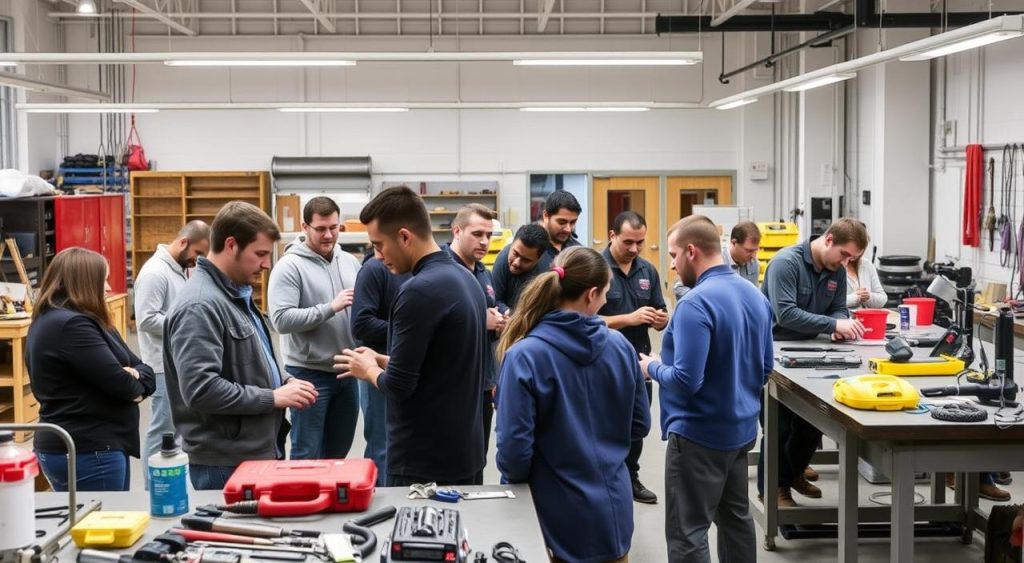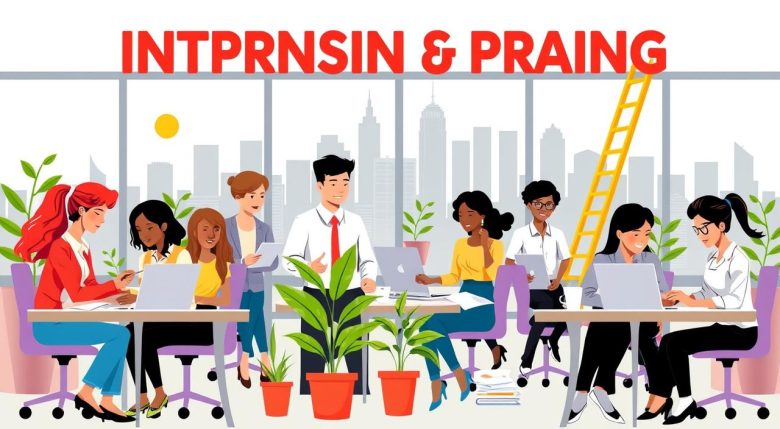75% of employers say hands-on experience is key in hiring. Internships and trainee programs are great ways to start your career. They offer real-world experience, which is crucial in today’s job market.
These experiences combine theory and practice. They help ambitious people turn their education into success. Internships and trainee programs lead to important industry connections and better job skills.
These experiences make it easier to join the workforce. They give you the skills and knowledge to do well. Starting with these experiences is more than just filling your resume. It’s the first step in a lifelong journey of learning and growing professionally.
Understanding the Value of Professional Experience Early On
In today’s fast-changing job market, getting professional experience early is key. It boosts your job readiness and shapes your career path. Let’s dive into why early experience is crucial for success.
Why Experience is a Game-Changer in Today’s Job Market
Getting real-world experience through internships or trainee programs makes you stand out. It shows you can use what you learned in real life. It also shows you’re serious about your career. In a competitive job market, this experience can set you apart and make you more employable.
The Impact of Internships and Traineeships on Career Trajectories
Internships and traineeships are key to many successful careers. They give you the skills and knowledge you need. They also help you grow professionally and build your network. Plus, they give you a peek into how industries work, helping you make smart career choices.
Case Studies: Success Stories and Lessons Learned
Many success stories show how important internships and traineeships are. They’ve helped tech innovators and marketing moguls alike. These experiences teach you skills that textbooks can’t. They give you a solid base for your career and future success.
Looking at these stories, we see a pattern. Being proactive in internships helps you find your career path. These experiences sharpen your skills and help you understand industry needs. This is vital for anyone aiming to excel in their field.
The Role of Internships in Higher Education
Internships are key in higher education, blending theory with practice. They help students get ready for the real world. This is crucial as academic programs aim to link classroom learning with practical skills.
Universities and companies work together to offer internships. These opportunities help students learn by doing. They prepare students for the challenges of their future careers.
Here’s a table showing the benefits of internships in higher education:
| Benefit | Description | Impact on Students |
|---|---|---|
| Enhanced Understanding | Direct exposure to industry-specific practices and problems. | Improves problem-solving skills and technical knowledge. |
| Professional Networking | Opportunities to connect with professionals and experts in the field. | Builds valuable connections that can aid in job placement post-graduation. |
| Real-World Skills | Development of workplace communication and team collaboration skills. | Prepares students for the dynamics of professional environments. |
Internships make academic programs better and boost students’ job chances. They combine real-world experience with classroom learning. This makes education more complete and prepares students for their careers.
Navigating the World of Vocational Training and Skills Development
Vocational training is a key alternative to college, focusing on specific skills needed in the job market. It’s important for students to develop their skills and fill job gaps in different fields.
Vocational training covers many areas like construction, culinary arts, healthcare, and technology. It gives students a direct route to jobs in these fields. These programs focus on practical skills, preparing students for a career right after they finish.

Vocational training uses modern skills training methods. It’s designed to keep up with market changes and new technologies. It’s also great for lifelong learning and career growth, helping people improve their skills over time.
- Immediate job readiness
- Specialized training for specific trades
- Flexibility to adapt to new industry standards
Vocational training is more than just learning; it’s a path to real careers. It helps people grow their skills and find economic stability. As the job market gets tougher, the need for specific skills training is more important than ever.
Education and Career: Integrating Academic Learnings with Industry Practice
In today’s fast-paced job market, linking academic programs with real-world practice is key. Schools are updating their courses to give students both book knowledge and practical skills. This mix is essential for career growth and being ready for the job market.
How Academic Programs are Adapting to the Demand for Practical Skills
Academic programs are changing fast to meet industry needs. They now include hands-on experiences to connect classroom learning with real jobs. This change is because employers want graduates who can act, not just think.
The Bridge Between Theory and Real-World Application
Academic programs now use case studies, internships, and projects to mix theory with practice. This approach helps students get real-world experience and understand workplace realities.
Collaboration Between Universities and Businesses
Working together, schools and companies are creating curricula that match today’s job needs. These partnerships help link what students learn in class with what they’ll face in the workplace.
Here’s a closer look at how some fields are adding practical skills to their programs:
| Academic Field | Integration of Practical Skills | Partnerships with Industries |
|---|---|---|
| Computer Science | Development of software projects | Technology and software companies |
| Business Management | Case studies and management simulations | Financial and consulting firms |
| Environmental Science | Fieldwork and sustainability assessments | Environmental agencies and non-profits |
| Engineering | On-site training in machinery handling | Manufacturing and engineering firms |
Maximizing Job Readiness Through Trainee Programs
The business world is changing fast. This makes the gap between what we learn in school and what employers need bigger. Trainee programs are key to bridging this gap. They help students get the skills needed to smoothly enter the workforce.
Well-designed trainee programs prepare students for their future jobs. They make sure participants are ready to handle the challenges of their roles.
From Classroom to Boardroom: Preparing for the Transition
Going from school to work can be tough. Trainee programs help by facing students with real-world problems. This lets them apply what they learned in class.
This preparation is crucial. It helps students understand how things work in the professional world. It also teaches them about their responsibilities.
Key Skills Employers Look for in Trainees
- Problem-solving abilities: The ability to tackle and solve problems specific to the industry.
- Technical expertise: Knowing how to use the right tools and technology to help the team.
- Adaptability: Being able to adjust to new situations and goals at work.
- Leadership potential: Having the skills to manage projects and lead teams.
Designing a Trainee Program That Meets Market Needs
To make trainee programs effective, they must match what the market needs. Getting input from industry leaders is very helpful. It shows what skills are most wanted.
Keeping the program up-to-date is also important. This means changing the curriculum as technology and trends change. This keeps the training relevant and useful.
Combining practical training with theory makes the program better. It prepares students well for their future careers.
Professional Development: Growth Opportunities Post-Internship
After an internship ends, the journey to grow professionally continues. The key is to use the experiences and connections made. This part talks about how to use these chances for growth, like mentorship, advanced training, and moving into full-time jobs.
Networking and Mentorship During Internship
Networking and finding mentors are key during an internship. These connections offer guidance and support for career growth. A mentor can provide advice, insights, and introduce you to important people in your field.
Advanced Training and Further Education After Internship
Continuing to learn is important for career growth. Many fields need ongoing education to stay current. This could mean getting certifications, attending workshops, or taking courses related to your career.
Transitioning from an Intern to a Full-time Employee
Going from intern to full-time employee is a big step. It requires skills learned during the internship and understanding of the workplace. Those who show initiative, adaptability, and a strong work ethic are more likely to get a permanent job.

The Benefits of Internships for Career Advancement
Internships are key for those looking to succeed in the job market. They offer a chance to learn and grow, leading to better career advancement. Internships help shape a person’s professional path and open up many job opportunities.
- Skill Acquisition: Internships let you learn skills needed today. You can pick up technical skills or soft skills like teamwork and problem-solving. This makes you stand out.
- Professional Networking: Internships connect you with professionals. They can guide you, offer jobs, and give you recommendations that help your career.
- Resume Enhancement: Internships make your resume stronger. They show you’re dedicated and skilled, helping you get noticed in job searches.
- Insight into Career Paths: Interns learn about different jobs. This helps them choose a career that fits their skills and interests.
Many employers see internships as a test. If you do well, you might get a full-time job. This is especially true in tough fields where experience matters as much as education. So, internships are more than just temporary jobs. They’re a way to get into good job opportunities and advance your career.
Internships are essential for those starting their careers. They give you the skills, knowledge, and connections you need to succeed. As companies value experience more, internships become even more important for your professional growth.
Choosing the Right Internship: Factors to Consider
Finding the right internship is key for those starting their careers. It’s important to think carefully about many factors. We’ll look at the main things to check to make sure your internship fits your career plans and what you want.
Aligning Internship Roles with Career Goals
First, think about how the internship matches your future career goals. A good internship should help you move closer to your dream job. Look at the tasks you’ll do and see if they fit with your career dreams.
Evaluating Internship Benefits: Practical Experience vs. Compensation
Money matters, but don’t forget about the experience you’ll get. Sometimes, an internship with less pay can give you more valuable learning and connections. Think about what’s best for your career.
Researching Companies and Culture Fit
The company culture is also very important. Learn about the company’s values and team to see if it’s a good place for you to grow. A company that shares your values and supports learning is usually better than one that doesn’t.
Making a smart choice can make your internship experience great. Take time to look into these important points. This way, you’ll find an internship that meets and maybe even goes beyond your hopes.
Skills Training and Personal Development During Internships
Internships are key for skills training and personal development. They help improve technical skills and grow a professional identity. Interns learn by working on real projects, gaining essential skills for the job market.
Internships offer a wide range of skills training opportunities. You can learn technical skills, industry protocols, and soft skills like communication and teamwork. This hands-on learning prepares you for your future role and enhances your overall skills.
- Technical skills relevant to the industry
- Project management and organization
- Critical thinking and problem-solving
- Effective communication and interpersonal abilities
- Time management and adaptability
Internships also focus on personal development. You get to build professional relationships, understand workplace culture, and take on responsibilities. These experiences boost your confidence and professional image.
- Nurturing professional relationships and networking
- Learning to navigate and adapt to corporate culture
- Developing a self-reliant and proactive approach to tasks and challenges
By the end of an internship, you’re ready for the challenges of modern careers. You have improved skills and a new perspective on personal development.
| Skills Type | Examples | Benefits |
|---|---|---|
| Technical Skills | Software proficiency, analytical skills | Direct application in job functions |
| Soft Skills | Team collaboration, leadership | Widely applicable across various roles |
| Adaptive Skills | Problem-solving, flexibility | Improves overall job performance |
Internships are more than just a step towards a job. They are a key part of personal and professional growth. They prepare you to face the challenges of the workforce with a well-rounded set of skills and a strong personal development.
Exploring Job Opportunities After a Trainee Program
Finishing a trainee program opens up big career chances. It’s important to know how to find and apply for jobs after this experience.
Job opportunities after a trainee program are many and varied. Fields like tech, finance, and healthcare offer great paths. These paths are made better by the skills and knowledge gained during training. The trick is to stand out in the job market.
- Update your resume with your traineeship roles and duties
- Connect with people you met during the program
- Keep learning to fill any gaps between your traineeship and job needs
Being strategic can really help you get noticed by employers. Showing how you used your traineeship in real jobs is key. It shows you’re ready and flexible.
| Industry | Skills Acquired | Potential Job Roles |
|---|---|---|
| Technology | Software Development, Data Analysis | Junior Developer, Data Analyst |
| Finance | Risk Management, Financial Forecasting | Financial Analyst, Risk Consultant |
| Healthcare | Patient Management, Clinical Research | Clinical Research Coordinator, Healthcare Administrator |
Each job in the table needs skills you learned in a trainee program. For example, a tech trainee can easily move into a Junior Developer or Data Analyst role. These jobs use the tech skills and problem-solving you learned.
To turn your trainee experience into a real career, focus on these steps:
- Keep learning to get better at what you do.
- Use LinkedIn and other networks to show off your work and get endorsements.
- Get ready for interviews by talking about how your traineeship fits with the company’s goals.
Moving from trainee to full-time professional is all about being proactive. Show how your traineeship is part of your professional growth. This makes you more ready for jobs and valuable to employers.
Conclusion
The connection between education and career is greatly helped by internships and trainee programs. These experiences are not just for exploring but also for building a strong foundation for professional growth. They offer real-world skills and knowledge, making them crucial in today’s job market.
Internships and trainee programs help bridge the gap between book learning and real-world application. They prepare individuals with skills that employers want. These early experiences also help build professional networks, which are valuable throughout a career.
We believe it’s important to take advantage of these opportunities. We encourage aspiring professionals to choose roles and organizations that will help them grow. This is more than just adding to your resume; it’s about building a career filled with knowledge, skills, and connections. So, investing in these programs is a smart move for your future, leading to professional growth and success.



